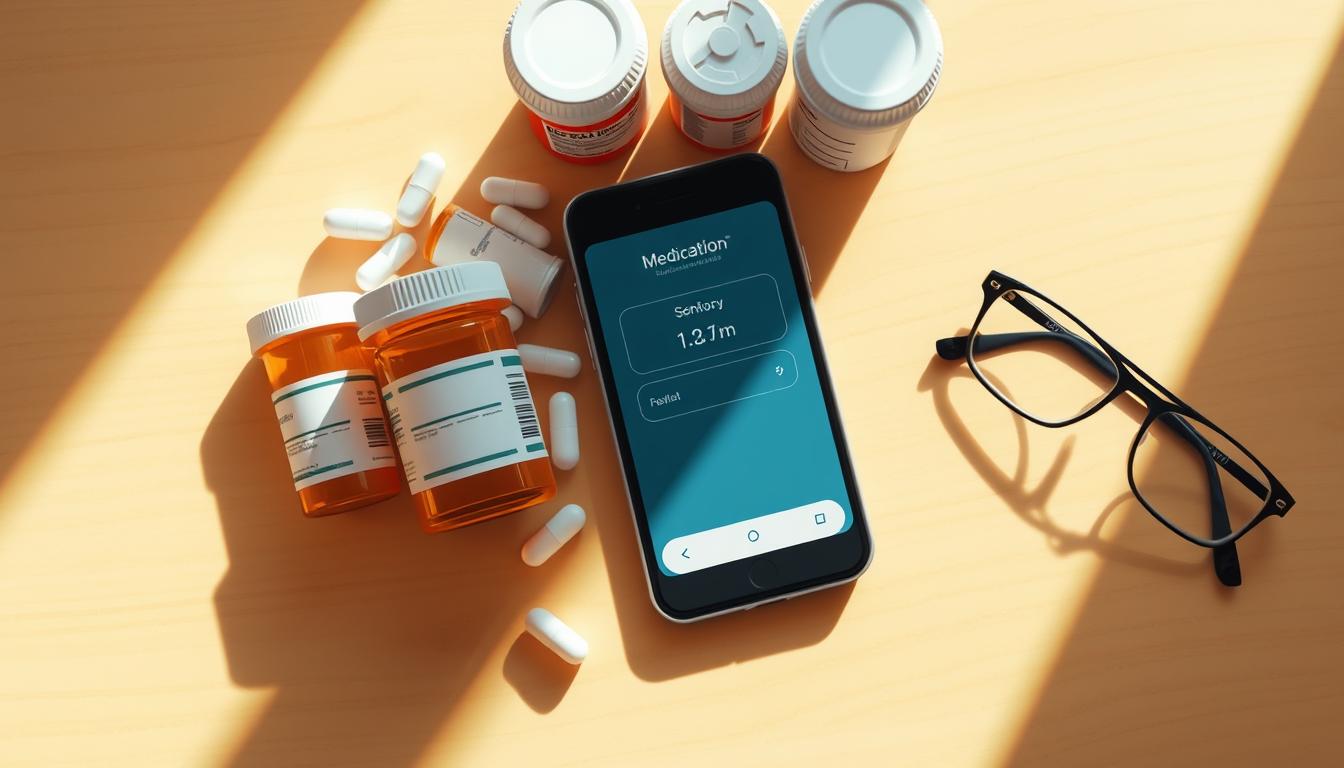How to set medication reminders on your phone
Did you know nearly half of all prescriptions aren’t taken properly? Missing doses or taking pills at the wrong time can lead to serious health risks. For older adults juggling multiple prescriptions, this challenge grows daily. But there’s good news: your smartphone can become a powerful tool to keep you on track.
A 2017 study revealed something surprising. When people received daily text alerts, missed doses dropped from 46% to just 5% in two weeks. Delays in taking pills fell from 85% to 18%. These numbers show how small changes—like using your phone’s alarm—can make a big difference.
Why does this matter? Managing prescriptions isn’t just about convenience. It’s about preventing hospital visits and staying healthy long-term. Phone-based alerts work because they’re customizable, easy to use, and fit naturally into your routine. You can set specific times, add notes, or even sync reminders with family members.
This guide will walk you through creating a system that works for your needs. You’ll learn how to turn your device into a personal health assistant, reduce stress, and protect your well-being. Let’s get started!
Understanding the Importance of Medication Reminders
Managing daily prescriptions effectively becomes crucial as we age, yet many face unseen obstacles. Physical and cognitive changes can turn routine tasks into daily hurdles. Let’s explore why consistent support matters and how small adjustments create meaningful improvements.
Recognizing Common Barriers
Memory lapses caused by cognitive decline often lead to confusion about whether pills were taken. Vision issues add another layer of difficulty—small labels or similar-looking bottles increase the risk of dangerous mix-ups.
Complex schedules with multiple pills at different times overwhelm even the most organized individuals. Unpleasant side effects like nausea might make someone skip doses entirely. Even simple tasks like opening childproof containers become struggles for those with arthritis.
When Doses Are Missed
Skipping prescriptions doesn’t just delay progress—it can reverse it. Irregular adherence often leads to hospital visits, worsened conditions, or new complications. For those managing chronic issues, consistency is the bridge between stability and decline.
Understanding these challenges helps caregivers select solutions that address specific needs. Whether it’s voice-activated alerts or easy-open lids, the right tools restore confidence and safety in daily routines.
Choosing the Right Tools for Reminders
With so many options available, finding the perfect reminder tool can feel overwhelming. The key is matching technology to your daily habits and comfort level. Let’s explore solutions that blend seamlessly into your life while keeping health priorities front and center.
Smartphone Apps and Built-in Alerts
Your phone already has powerful tools waiting to be used. Apps like Medisafe or MyTherapy go beyond basic alarms—they track refills, log doses, and even warn about drug interactions. Prefer simplicity? Google Calendar or Apple Reminders can buzz at set times without extra downloads.
Many pharmacies now send automated texts when it’s time to refill or take prescriptions. Ask your pharmacist about this free service during your next visit.
Wearable Devices and Smart Home Integration
Smartwatches deliver gentle wrist vibrations, making them ideal for active lifestyles. Pair them with voice assistants like Alexa for hands-free updates: “What’s my next dose?”
Pill organizers with built-in alarms offer a hybrid approach—traditional sorting meets modern tech. For those managing complex schedules, smart home systems can announce alerts room-to-room, ensuring you never miss a critical time.
Essential Tips for Medication Reminders for Seniors
Creating a reliable system for managing prescriptions starts with smart habits and clear organization. Simple strategies can transform confusion into confidence, helping you stay on track without stress.
Building Daily Routines and Pairing with Activities
Link your pill schedule to activities you already do daily. Take your morning dose while brewing coffee, or pair evening pills with brushing your teeth. This habit stacking method turns new tasks into automatic actions.
Keep your pill box near items you use at specific times—like beside the coffee maker or toothbrush holder. Visibility matters. A study showed people remember tasks 65% better when triggers are in their direct line of sight.
Utilizing Visual Aids and Clear Labels
Color-coding simplifies complex schedules. Use blue tape for morning doses and red for bedtime. Write labels in bold, large print—stick them on bottles and organizers. This approach helps those with vision challenges quickly identify their needs.
Choose a weekly pill box with separate compartments labeled “AM” and “PM.” Models with alarms add extra reassurance. For multiple daily doses, try rotating caddies that show which day’s pills come next.
These visual systems reduce errors and build independence. Pair them with your phone’s alarm for a layered approach that keeps health priorities front and center.
Integrating Reminders into Your Daily Routine
Your daily meals hold a secret weapon for staying on track with prescriptions. By weaving pill schedules into existing patterns, you create automatic cues that work even when memory falters.
Sync Prescriptions with Natural Rhythms
Pair pills that require food with breakfast or dinner. This does more than prevent forgotten doses—it boosts absorption rates by 30-50% for some drugs. Your morning oatmeal becomes both meal and medicine booster.
Place a weekly organizer where you eat most often. Kitchen counters or dining tables act as perfect visual prompts. For pills needing water, keep a dedicated glass beside your plate. Studies show these placement tricks increase adherence by 42%.
When schedules shift, set backup alerts. Traveling? Pack dose-specific containers labeled “With Lunch” or “After Snack.” Eating out? Snap a photo of your pill case before leaving as a quick checklist.
Link evening doses to activities like turning on the TV or brewing tea. These habit anchors make timing effortless. Over weeks, your brain starts connecting dinner plates with pill bottles automatically—no sticky notes required.
Exploring Advanced Reminder Options and Services
Technology now offers innovative ways to simplify complex health routines. From pre-sorted pill packs to smart home integrations, these solutions blend convenience with cutting-edge support. Let’s dive into tools that help you maintain independence while keeping loved ones informed.
Comparing Digital Solutions and Pre-dosed Services
Services like PillPack by Amazon Pharmacy deliver pre-sorted daily packets with clear labels. Each dose arrives ready to use, eliminating confusion for those managing multiple prescriptions. This approach reduces errors by 76% compared to manual sorting, according to recent studies.
Apps like Medisafe take alerts further. Their Medfriend feature notifies family members if a dose is missed. You’ll also get warnings about potential drug interactions, creating an extra safety net. With 4.7-star ratings, users praise its simple interface and reliable refill reminders.
Leveraging Smart Home and Caregiver Alerts
Smart speakers can announce dose times through connected devices. Ask Alexa to repeat instructions or confirm you’ve taken pills. These systems sync with apps, letting caregivers check adherence remotely while respecting privacy.
Professional care teams add another layer of support. They can organize weekly pill boxes and update your pharmacist about changes. For family members, real-time alerts provide peace of mind without constant check-ins.
Wrapping Up Your Medication Reminder Setup
Now that you’ve built your personalized alert system, keeping it effective requires ongoing attention. Store your pills in a cool, dry place—like a kitchen cabinet away from appliances. Heat and humidity can weaken their potency, making proper storage part of your success plan.
Create a master list with every prescription’s name, dosage, and schedule. Bring this to checkups so your doctor can spot potential drug interactions. Digital apps or a simple notebook work great for tracking what you’ve taken each day.
Set calendar alerts to review your setup every few months. Life changes—new prescriptions, schedule shifts, or health updates—mean your tools might need tweaking. Sync with your pharmacist during refills to confirm dosing times still fit your routine.
A well-maintained system does more than prevent missed doses. It builds confidence in managing your health while giving loved ones peace of mind. When alerts, organizers, and checkups work together, you’re set up for better health outcomes and lasting independence.

